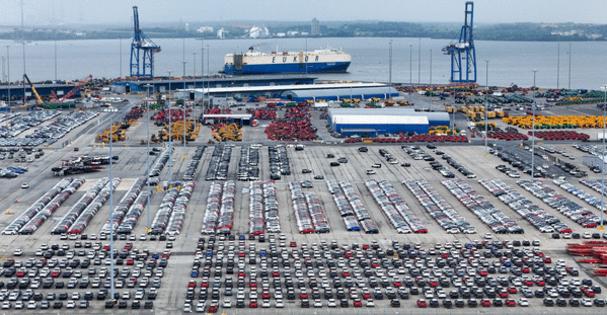Port of Baltimore's auto importers navigate Trump's tariffs
Published in Business News
Mitsubishi Motors is still shipping cars from Japan to Baltimore, even as Trump administration tariffs take hold. But none of the cars are headed to customers — yet.
For now, the Japanese automaker is holding the vehicles it sends to the Port of Baltimore and three other U.S. ports — in Florida, California and Washington — at those facilities, spokesman Jeremy Barnes said in an email Friday.
“We will continue to evaluate this situation and will make the decision to release vehicles at the appropriate time,” Barnes said.
The delay is due to President Donald Trump’s 25% tariffs on autos and certain parts. Automakers don’t pay a tariff on their imported vehicles until they remove them from port facilities, and some are choosing to leave their products in limbo as they assess their final costs and whether to add import fees to the price tags or to absorb the tariffs.
“The auto manufacturers are individually making decisions on how they want to proceed,” said Richard Scher, a spokesman for the Maryland Port Administration, which oversees the port’s public marine terminals. While the auto tariffs took effect April 3, the Trump administration offered some relief in partial reimbursements for vehicles that go through final assembly in the U.S.
Mitsubishi has been offloading and holding vehicles at Dundalk Marine Terminal, one of the port’s public terminals, since April 8, Scher said. Volkswagen, which ships Audi vehicles to the port’s private Tradepoint Atlantic terminal in Sparrows Point has been doing the same, he said.
Mitsubishi is storing cars at the port outside areas designated as foreign trade zones, which are exempt from tariffs and other taxes, and was required to pay the 25% levy, according to the port. Barnes, the company spokesman, declined to comment on the storage location or duties paid, saying the decision was made to hold autos “to evaluate the longevity and impact of the tariffs on our business.”
Audi offloads cars at a marine terminal on the former site of Bethlehem Steel. A spokeswoman for the carmaker did not directly say whether tariffs were why the vehicles remained at the port.
“We are focused on ensuring that dealers have the right inventory to meet customer demand,” said Michele Lucarelli of Audi of America, Inc.
Tradepoint does have several active foreign trade zones, said terminal spokesman Aaron Tomarchio, but does not manage any of the zones related to Audi or other automakers.
The facility operates several zones for bulk cargo, or goods shipped without individual packaging, and break-bulk cargo that can’t fit in standard containers.
Those foreign trade zones “have been fairly full with the onshoring of cargo we have seen over the last couple of months,” he said.
Baltimore’s port handled the second-highest volume of cars and light trucks of all U.S. ports last year, slipping from the top spot after the collapse of the Francis Scott Key Bridge. The port was shut down for weeks after the freighter Dali struck the bridge in late March 2024, causing it to collapse and killing six construction workers. The wreckage blocked access to most cargo vessels.
About 85% of all vehicles handled at the Port of Baltimore are imported.
General Motors, one of the port’s top auto importers, cut its profit forecast Thursday and said tariff costs are expected to eat away up to $5 billion.
The port is also bracing for impacts to its container shipping business, especially from China. That nation is the source of 40% of inbound containers to the U.S. overall, and is facing tariffs of as much as 145%.
Import fees are charged based on when goods were loaded on a ship, prior to the voyage to the U.S. Vessels that departed Asia after tariffs took effect won’t arrive until at least sometime this month on the West Coast and sometime in June on the East Coast, said John D. McCown, a shipping expert and non-resident senior fellow at the Center for Maritime Strategy.
“In terms of volume for the Port of Baltimore, container volume in June is going to be the first real tangible indication of that,” McCown said.
McCown estimates that the year-over-year change in container cargo at U.S. ports will be pronounced, with an overall reduction of 25% and the share of imports from China shrinking.
“That commerce isn’t going to happen,” he said.
Instead, Chinese companies may shift production to affiliates in Vietnam. And U.S. shippers may divert shipments through Canada and Mexico. All of these changes could hurt cargo volume and dock workers at ports in Baltimore and elsewhere, he said.
“I think these overall tariffs frankly are just going to be massive and a nightmare,” he said. “Once people start to see the impact of these, there will be pressure to rethink this.”
©2025 The Baltimore Sun. Visit at baltimoresun.com. Distributed by Tribune Content Agency, LLC.












Comments